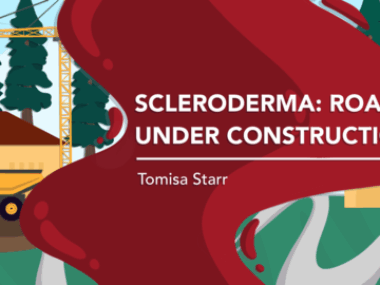Developing a plan is helpful when dealing with medical uncertainty
Scleroderma can be unpredictable, so I'd rather be informed and take action
Written by |

I had a chest CT scan in April 2024, and then another one last March. I’m experiencing a bit of anxiety and uncertainty about the most recent scan.
There are some things about having a rare chronic illness like scleroderma that I just can’t control. This frustrates me because I like to feel like I’m in control of things. When I’m not, it makes me stressed and anxious.
People with scleroderma have an increased risk of cancer. My chest CT scan last year showed an 8-mm spiculated nodule in one of my lungs. My recent scan showed that the nodule had apparently shrunk to 7 mm. I didn’t know what having this lung nodule might mean, so I needed to know more. I was concerned that it might have a connection to cancer.
Even though I know some things about how scleroderma affects me, I still don’t think I have all the answers. Since scleroderma is a complex disease involving multiple bodily systems, it affects everyone differently. Knowledge is power, because you never know when a seemingly small thing might lead to a bigger issue, like cancer, for example.
I used to be someone who tried to avoid bad news at all costs, but I’m not like that anymore. I prefer to know what’s going on, because I find knowing to be reassuring in a sense. It actually helps me feel like I’m in control. When I know what is happening to me and what to expect, I feel better.
I also find it reassuring to have a doctor who explains what they are doing and why. If I don’t understand something my physician does or the meaning of a test result, it’s my responsibility to ask questions.
So I looked at my previous medical reports to see if I could track the growth of this nodule. In 2019, it measured 5 mm. It appeared that in five years, it had grown slightly, by 3 mm. I wanted to know more, so I decided to communicate that with my doctor and ask questions.
There are other things I can do to help my physician address my concerns. One is to keep track of my symptoms by writing them down and making a list of things to bring up with my doctor. Developing a plan of action helps me feel like I’m in charge of what happens to me.
To deal with my current uncertainty, I’ve decided on a strategy: At my next rheumatologist appointment, I’ll ask about the nodule. I’ve also made an appointment to see a lung specialist who can evaluate it.
While I can’t eliminate uncertainty in my life, I can choose how I react to it. Developing a plan is a great way to deal with uncertainty and can help me take charge of my life and relieve stress.
Note: Scleroderma News is strictly a news and information website about the disease. It does not provide medical advice, diagnosis, or treatment. This content is not intended to be a substitute for professional medical advice, diagnosis, or treatment. Always seek the advice of your physician or other qualified health provider with any questions you may have regarding a medical condition. Never disregard professional medical advice or delay in seeking it because of something you have read on this website. The opinions expressed in this column are not those of Scleroderma News or its parent company, Bionews, and are intended to spark discussion about issues pertaining to scleroderma.







Melinda LeBlanc
Tomisa, I'm glad you are taking the initiative to follow up with your rheumatologist. If he/she can't answer all your questions, find someone who can! Sending prayers for you. And be assured that, if at some point there is cancer, there are some amazing cancer drugs available now which can help.
Dawn Hagen
I completely agree on your comment - it is SO important to have a doctor who actually listens to you! It took far too long to find the right docs in my corner, but now that I do I feel better literally and figuratively. All my best to you!
Dawn